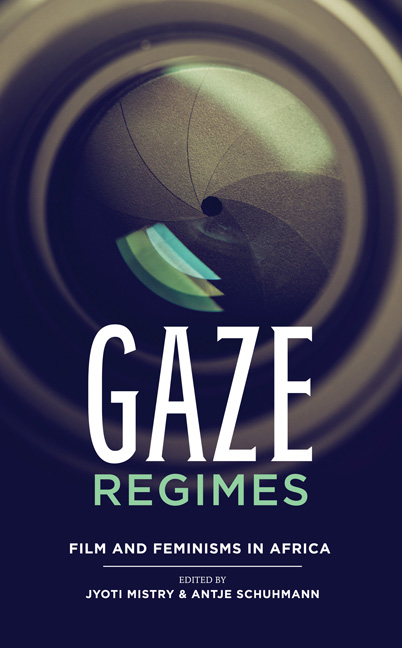Book contents
- Frontmatter
- Contents
- Acknowledgements
- Foreword: Goethe-Institut sub-Saharan Africa
- Introduction: By way of context and content
- 1 African Women in Cinema: An overview
- 2 ‘I am a feminist only in secret’
- 3 Staged Authenticity: Femininity in photography and film
- 4 ‘Power is in your own hands’: Why Jihan El-Tahri does not like movements
- 5 Aftermath – A focus on collective trauma
- 6 Shooting Violence and Trauma: Traversing visual and social topographies in Zanele Muholi's work
- 7 Puk Nini – A Filmic Instruction in Seduction: Exploring class and sexuality in gender relations
- 8 I am Saartjie Baartman
- 9 Filmmaking at the Margins of a Community: On co-producing Elelwani
- 10 On Collective Practice and Collected Reflections
- 11 ‘Cinema of resistance’
- 12 Dark and Personal
- 13 ‘Change? This might mean to shove a few men out’
- 14 Barakat! means Enough!
- 15 ‘Women, use the gaze to change reality’
- 16 Post-colonial Film Collaboration and Festival Politics
- 17 Tsitsi Dangarembga: A manifesto
- Acronyms and Abbreviations
- List of Contributors
- Filmography
- Index
Foreword: Goethe-Institut sub-Saharan Africa
Published online by Cambridge University Press: 20 April 2018
- Frontmatter
- Contents
- Acknowledgements
- Foreword: Goethe-Institut sub-Saharan Africa
- Introduction: By way of context and content
- 1 African Women in Cinema: An overview
- 2 ‘I am a feminist only in secret’
- 3 Staged Authenticity: Femininity in photography and film
- 4 ‘Power is in your own hands’: Why Jihan El-Tahri does not like movements
- 5 Aftermath – A focus on collective trauma
- 6 Shooting Violence and Trauma: Traversing visual and social topographies in Zanele Muholi's work
- 7 Puk Nini – A Filmic Instruction in Seduction: Exploring class and sexuality in gender relations
- 8 I am Saartjie Baartman
- 9 Filmmaking at the Margins of a Community: On co-producing Elelwani
- 10 On Collective Practice and Collected Reflections
- 11 ‘Cinema of resistance’
- 12 Dark and Personal
- 13 ‘Change? This might mean to shove a few men out’
- 14 Barakat! means Enough!
- 15 ‘Women, use the gaze to change reality’
- 16 Post-colonial Film Collaboration and Festival Politics
- 17 Tsitsi Dangarembga: A manifesto
- Acronyms and Abbreviations
- List of Contributors
- Filmography
- Index
Summary
In the spring of 2010 the Goethe-Institut in Johannesburg initiated the forum ‘ARTSWork Platform: Meeting of African Women Filmmakers’ with the primary objective to build a platform for women pursuing careers in art. The inaugural focus was on women filmmakers.
Established filmmakers from 14 different countries across Africa came together to discuss the state of the industry from the perspective of women professionals, to promote female talent and to support each other in their efforts to ensure gender equality.
The processes and outcomes of the three-day meeting were astonishing. The main questions raised were of a concrete, professional nature. Challenges in terms of discrimination, access to funding and difficulties to operate confidently as professionals and employers in a male dominated field, were also addressed.
A fruitful discussion also centered on the content side of filmmaking. The production of images of Africa that challenge (neo-) colonial, patriarchal narratives, on the one hand, and patriarchal traditionalism on the other, is vital to women in Africa, who continue to assert spaces for self-expression and self-determinism.
Though a gathering of both men and women professionals might not have proceeded much differently, the impression is that this platform provided a space fruitful for the uninhibited exchange of such concerns.
Above all, though, the meeting emphasised the need for collaboration between women through co-productions or informal networks that would result from these spaces and similar contexts.
This publication is another valuable outcome of the meeting, which serves as a timely document of concerns and thoughts by women film practitioners at a certain moment in time and – hopefully – as a catalyst for future discussions.
- Type
- Chapter
- Information
- Gaze RegimesFilm and feminisms in Africa, pp. vii - viiiPublisher: Wits University PressPrint publication year: 2015



